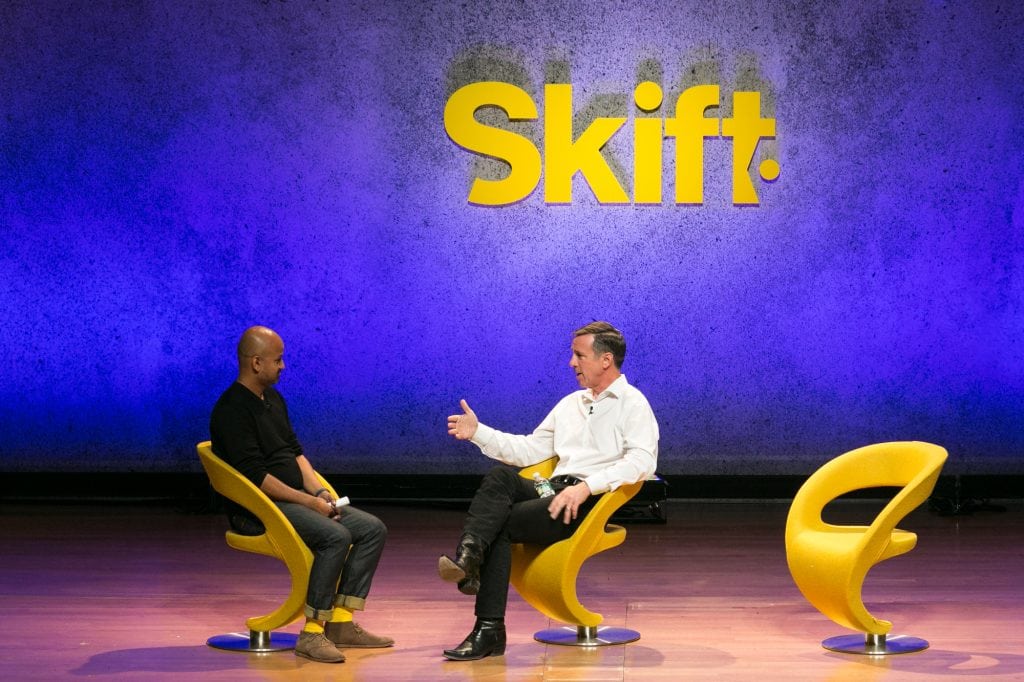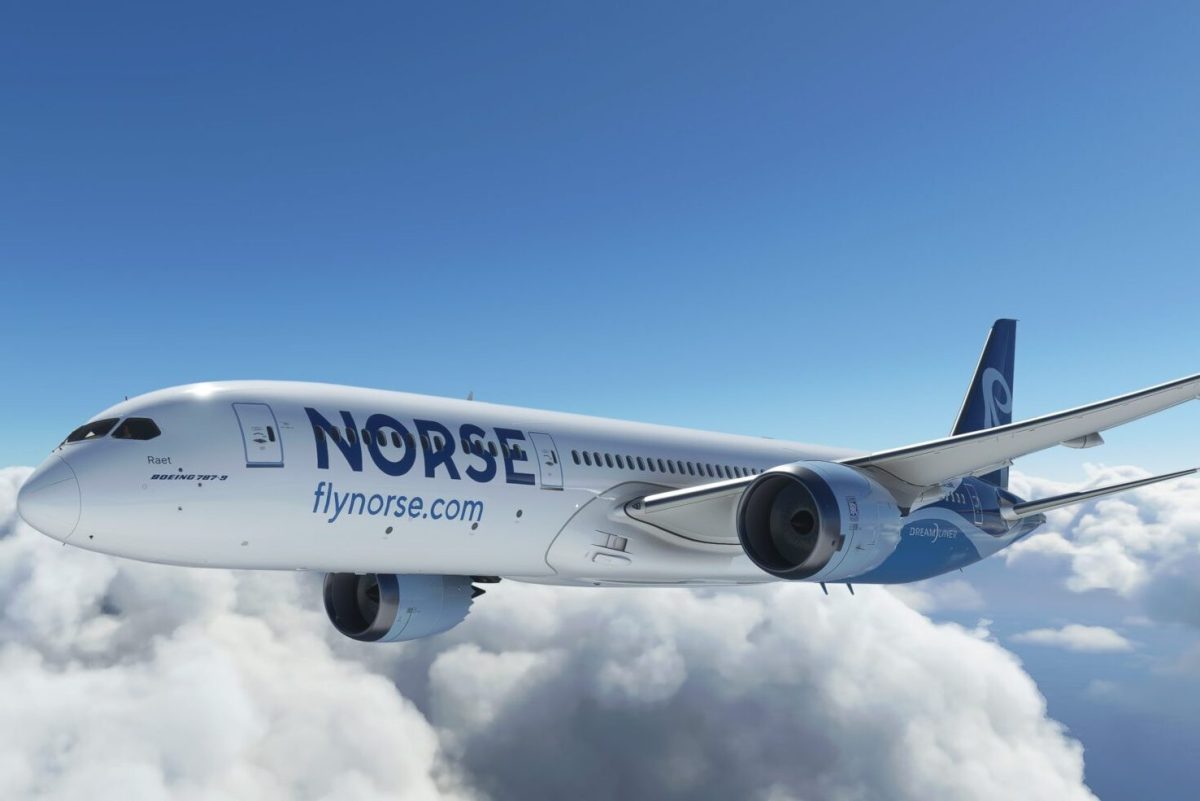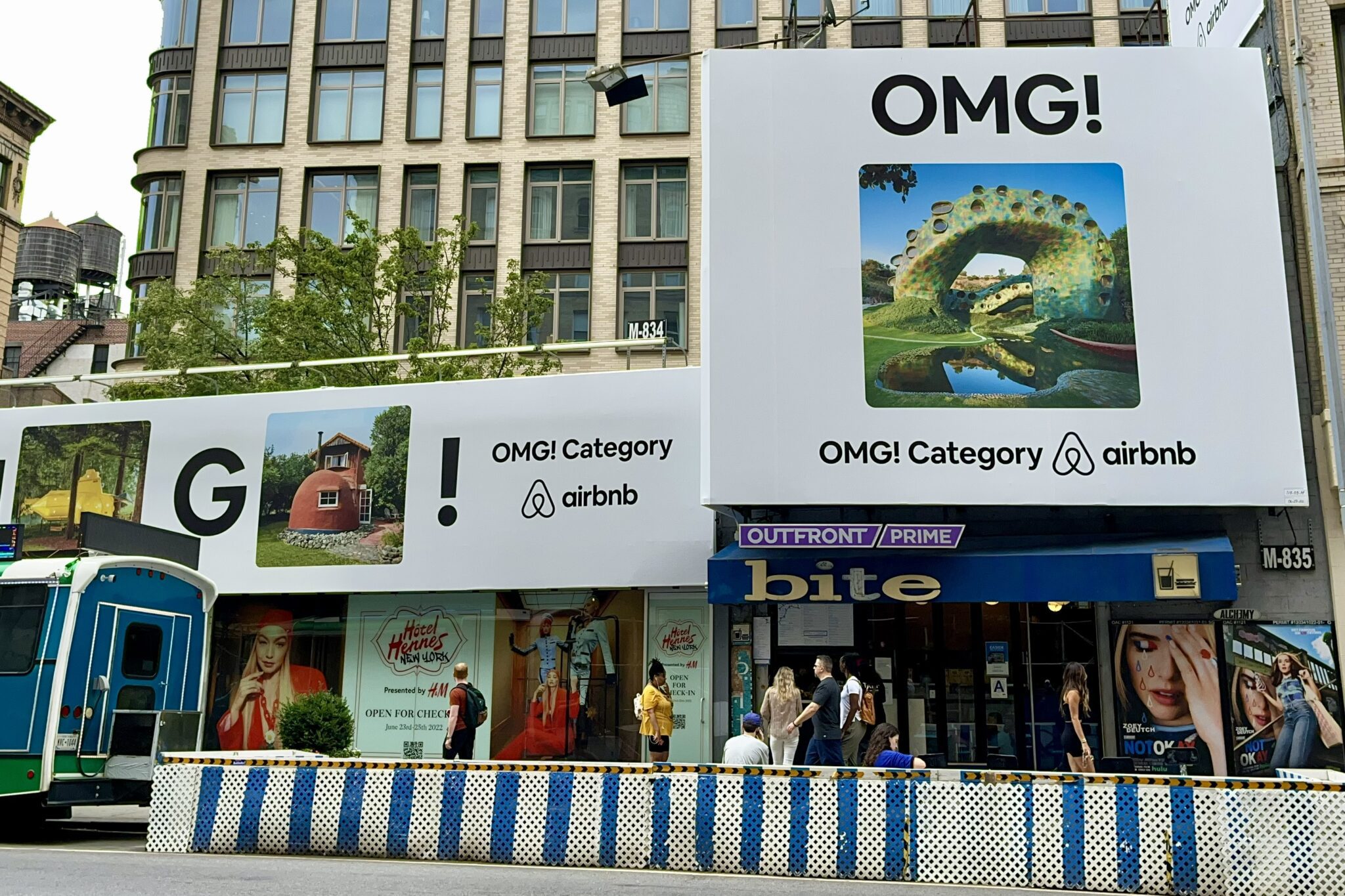Marriott CEO on Loyalty, Airbnb and Direct Bookings

Skift Take
Last Friday, when Marriott International finally announced it had closed its $13 billion acquisition of Starwood Hotels & Resorts, the bigger news wasn't necessarily about the creation of the world's new largest hotel operator.
Instead, it was the fact that the Marriott Rewards and Starwood Preferred Guest (SPG) programs were now linked, enabling status matching and points transfers.
So when Marriott CEO Arne Sorenson walked onto the stage at the Skift Global Forum in Manhattan on Tuesday, fresh off a merger-related media blitz, it was one of the first topics to be discussed.
"We decided [to link the programs] in January basically," Sorenson told Rafat Ali, Skift founder and CEO, going against the advice of numerous consultants who advised Marriott to "not do more than you have to do at closing because there's so much that can go wrong."
"Notwithstanding that, we thought we needed to deliver something immediately to our customers," he said. "SPG members, particularly, were asking, 'What will happen to our program?'"
Later, Sorenson noted, "For us to have momentum out of the gates, we needed to deliver immediate benefits. What do we do for guests? We looked at what the airlines have done. None of the airlines have linked accounts on close."
Bringing up airlines as an example of what major travel companies do when it comes to mergers and acquisitions was a notable example: After U.S. Airways and American Airlines closed on their merger in December 2013, it took at least five months for them to link their respective loyalty programs. And just hours before Sorenson appeared on the stage, loyalty experts Brian Kelly of The Points Guy and George Hobica of Airfarewatchdog debated the value of airline loyalty programs, and whether true airline loyalty still existed.
For hotels, and Marriott especially, however, the loyalty program was a crucial reason why Marriott pursued Starwood. Sorenson called the loyalty program "the principal tool we use to have direct relationships with our customers" and noted the "resonance" that SPG had with its members.
Ultimately, after forging ahead with Marriott's decision to establish links, but not necessarily merge the two loyalty programs, Sorenson said he was especially "pleased that it didn't leak. Nobody expected it."
And since announcing the news on Friday, Sorenson said 100,000 people on average, per day, are linking their SPG and Marriott Rewards accounts. "It's off to a good start."
About All Those 30 Brands
When asked if Marriott would eventually edit down its collection of 30 brands, 19 of its own and 11 from Starwood, Sorenson emphatically said, "None of them is going."
And when asked by an audience member if they'd be adding any new brands in the meantime, he joked, "Thirty brands can't possibly be enough? No there are not [any plans to add more brands]. We have a pretty complete lineup."
About Airbnb
In addition to talking about the importance of loyalty, Sorenson acknowledged the potential impact of Airbnb, which now has a $30 billion valuation, on the hospitality business, and that's something that continues to weigh heavily on hotelier minds.
Sorenson said there's "probably some" impact from Airbnb on the hotel business, "but the impact has been much less than most people would guess."
Where Airbnb is having an impact on hotels is during special or major city-wide events like the Olympics or the Republican or Democratic National Conventions, for example. It's during those times when "hosts on Airbnb and other platforms are rationally economic animals," Sorenson noted. "That can impact profitability."
When asked if Marriott would ever use Airbnb as a distribution channel, Sorenson didn't give a direct comment. He did say he understood why Airbnb makes sense for certain types of travelers, like smaller groups who prefer a more home-like environment instead of a hotel. He suggested the possibility of Marriott creating rooms that offered more common living-area spaces.
Sorenson also noted Airbnb succeeds in influencing the overall hospitality industry with its emphasis on local experiences, and that if Marriott attempted to enter that space, the consequences would be very different.
"I had an interesting conversation with Airbnb folks and it was sobering to me," he said. "When somebody has a bad experience using Airbnb, they don't blame Airbnb. They blame the host or the guest — they essentially rake each other. I'm sure if Marriott were in the business, Marriott would be at fault. As a consequence, I think it's a tougher platform."
When Ali asked Sorenson if Millennials had an aversion to a corporate hotel company like Marriott attempting to offer more localized experiences, he said, "We've all got to be cautious about making Millennials monolithic. They are as different in their points of view from one another as any generation is. What Millennials are described as liking, I like a lot of those things, too. I don't think it's anti-corporate. It's anti-phony. You have to be authentic to what you are."
About the Direct Booking conflict
Sorenson also echoed some of the same sentiments shared earlier by Expedia Inc. CEO Dara Khosrowshahi. Khosrowshahi, when he took the stage at the Skift Global Forum, he said the so-called direct booking wars between hotels and online travel agencies (OTAs) like Expedia and Booking.com are a "mischaracterization."
"I think the [customer] data from OTAs is getting better," Sorenson said. "Historically we haven't really gotten much data form the OTAs."
Sorenson said the term direct booking wars is an overstatement and that the sites are delivering "truly incremental business for us — the leisure traveler who traveled once a year or less and didn't know the brands. We couldn't market to those folks and we didn't know those folks. Those customers still exist and they can still get value from going to Expedia or Priceline and they exist all around the world. The tension in the relationship is not really there."
Instead, what Marriott and other hotel companies are focused on is eradicating the "impression in the marketplace that their [OTAs'] rates are less than what you can get on Marriott.com."
About Anbang
As Sorenson noted before, as did Bill Marriott, there was a point in the bidding war with Anbang where Marriott thought it would lose Starwood to Anbang.
He said the first person to notify him of Anbang's resurgence in its pursuit to buy Starwood was Starwood CEO Thomas B. Mangas who simply called and said, "They're back."
Anbang had originally placed bids for Starwood in May 2015 and resurfaced, unexpectedly, in March 2016, just as Marriott and Starwood's shareholders were scheduled to vote on their transaction.
When asked if he thought the extended antitrust review process in China was in any way connected to Anbang's bid, he said, "I think the approval process afterward had nothing to do with that. I don't think they were penalizing us. I don't' think it was Donald Trump."
About the Current State of the World
Given Sorenson's involvement with the President's Export Council and U.S. Travel, he said that travel, as an industry is "in as good a place for the industry globally and in the U.S. as we've ever been."
However, he's concerned about the risks, including factors discouraging people from traveling to the U.S.
"The risk today is more exemplified by Donald Trump than any other American politician. You get folks who basically are turning inward, who are saying, in effect, keep the others out. Make our borders bigger, make it harder for people to come in. You're communicating to the rest of the world, 'You're not welcome.'"
To that statement, Ali made the audience laugh by saying, "Turns out the guy who owns hotels does not like guests" in reference to Trump.
When asked if fears related to Zika or, worse yet, terrorism were on his mind, Sorenson said they were but that "the team is already there. We live in a risky enough world where you have to respond quickly enough."
He added, "[Hotels] are soft targets in the sense that they are intended to be open to people. You won't have a successful hotel if you board up the door."
About the Future of Starriott-Marwood
So what's next for Marriott, other than continuing to work on integrating Starwood?
Sorenson didn't reveal too much but he did hint at some digital investments that Skift has previously reported on, including the use of geolocation data to offer targeted recommendations for guests, and the placements of online concierges or local planners or idea sites, or informational websites, in four or five different markets. He also said Marriott is investing in its mobile products to enable better messaging between guests and hotels.




